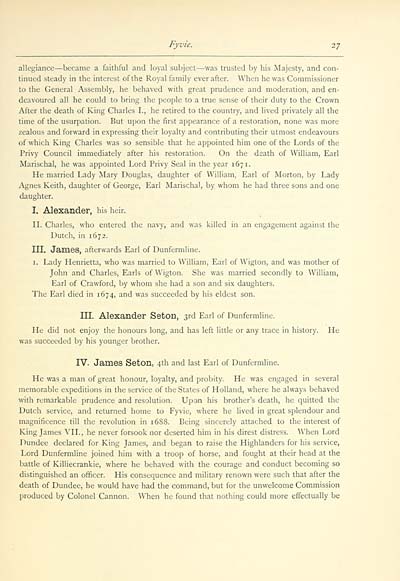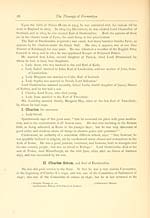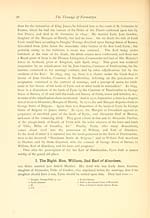New Spalding Club > Thanage of Fermartyn including the district commonly called Formartine
(49) Page 27
Download files
Complete book:
Individual page:
Thumbnail gallery: Grid view | List view

Fyvie. 27
allegiance — became a faithful and loyal subject — was trusted by his Majesty, and con-
tinued steady in the interest of the Royal family ever after. When he was Commissioner
to the General Assembly, he behaved with great prudence and moderation, and en-
deavoured all he could to bring the people to a true sense of their duty to the Crown
After the death of King Charles I., he retired to the country, and lived privately all the
time of the usurpation. But upon the first appearance of a restoration, none was more
zealous and forward in expressing their loyalty and contributing their utmost endeavours
of which King Charles was so sensible that he appointed him one of the Lords of the
Privy Council immediately after his restoration. On the death of William, Earl
Marischal, he was appointed Lord Privy Seal in the year 167 1.
He married Lady i\Lary Douglas, daughter of William, Earl of Morton, by Lady
Agnes Keith, daughter of George, Earl Marischal, by whom he had three sons and one
daughter.
I. Alexander, his heir.
IL Charles, who entered the navy, and was killed in an engagement against the
Dutch, in 1672.
III. James, afterwards Earl of Dunfermline.
I. Lady Henrietta, who was married to William, Earl of Wigton, and was mother of
John and Charles, Earls of Wigton. She was married secondly to William,
Earl of Crawford, by whom she had a son and six daughters.
The Earl died in 1674, and was succeeded by his eldest son.
III. Alexander Seton, 3rd Earl of Dunfermline.
He did not enjoy the honours long, and has left little or any trace in history. He
was succeeded by his younger brother.
IV. James Seton, 4th and last Earl of DunfermHne.
He was a man of great honour, loyalty, and probity. He was engaged in several
memorable expeditions in the service of the States of Holland, where he always behaved
with remarkable prudence and resolution. Upon his brother's death, he quitted the
Dutch service, and returned home to Fyvie, where he lived in great splendour and
magnificence till the revolution in 1688. Being sincerely attached to the interest of
King James VH., he never forsook nor deserted him in his direst distress. When Lord
]")undee declared for King James, and began to raise the Highlanders for his service.
Lord Dunfermline joined him with a troop of horse, and fought at their head at the
battle of Killiecrankie, where he behaved with the courage and conduct becoming so
distinguished an officer. His consequence and military renown were such that after the
death of Dundee, he would have had the command, but for the unwelcome Commission
produced by Colonel Cannon. When he found that nothing could more effectually be
allegiance — became a faithful and loyal subject — was trusted by his Majesty, and con-
tinued steady in the interest of the Royal family ever after. When he was Commissioner
to the General Assembly, he behaved with great prudence and moderation, and en-
deavoured all he could to bring the people to a true sense of their duty to the Crown
After the death of King Charles I., he retired to the country, and lived privately all the
time of the usurpation. But upon the first appearance of a restoration, none was more
zealous and forward in expressing their loyalty and contributing their utmost endeavours
of which King Charles was so sensible that he appointed him one of the Lords of the
Privy Council immediately after his restoration. On the death of William, Earl
Marischal, he was appointed Lord Privy Seal in the year 167 1.
He married Lady i\Lary Douglas, daughter of William, Earl of Morton, by Lady
Agnes Keith, daughter of George, Earl Marischal, by whom he had three sons and one
daughter.
I. Alexander, his heir.
IL Charles, who entered the navy, and was killed in an engagement against the
Dutch, in 1672.
III. James, afterwards Earl of Dunfermline.
I. Lady Henrietta, who was married to William, Earl of Wigton, and was mother of
John and Charles, Earls of Wigton. She was married secondly to William,
Earl of Crawford, by whom she had a son and six daughters.
The Earl died in 1674, and was succeeded by his eldest son.
III. Alexander Seton, 3rd Earl of Dunfermline.
He did not enjoy the honours long, and has left little or any trace in history. He
was succeeded by his younger brother.
IV. James Seton, 4th and last Earl of DunfermHne.
He was a man of great honour, loyalty, and probity. He was engaged in several
memorable expeditions in the service of the States of Holland, where he always behaved
with remarkable prudence and resolution. Upon his brother's death, he quitted the
Dutch service, and returned home to Fyvie, where he lived in great splendour and
magnificence till the revolution in 1688. Being sincerely attached to the interest of
King James VH., he never forsook nor deserted him in his direst distress. When Lord
]")undee declared for King James, and began to raise the Highlanders for his service.
Lord Dunfermline joined him with a troop of horse, and fought at their head at the
battle of Killiecrankie, where he behaved with the courage and conduct becoming so
distinguished an officer. His consequence and military renown were such that after the
death of Dundee, he would have had the command, but for the unwelcome Commission
produced by Colonel Cannon. When he found that nothing could more effectually be
Set display mode to: Large image | Transcription
Images and transcriptions on this page, including medium image downloads, may be used under the Creative Commons Attribution 4.0 International Licence unless otherwise stated. ![]()
| Publications by Scottish clubs > New Spalding Club > Thanage of Fermartyn including the district commonly called Formartine > (49) Page 27 |
|---|
| Permanent URL | https://digital.nls.uk/82213078 |
|---|
| Description | Volumes 47-53 are uniform with but not part of the club's series. |
|---|---|

